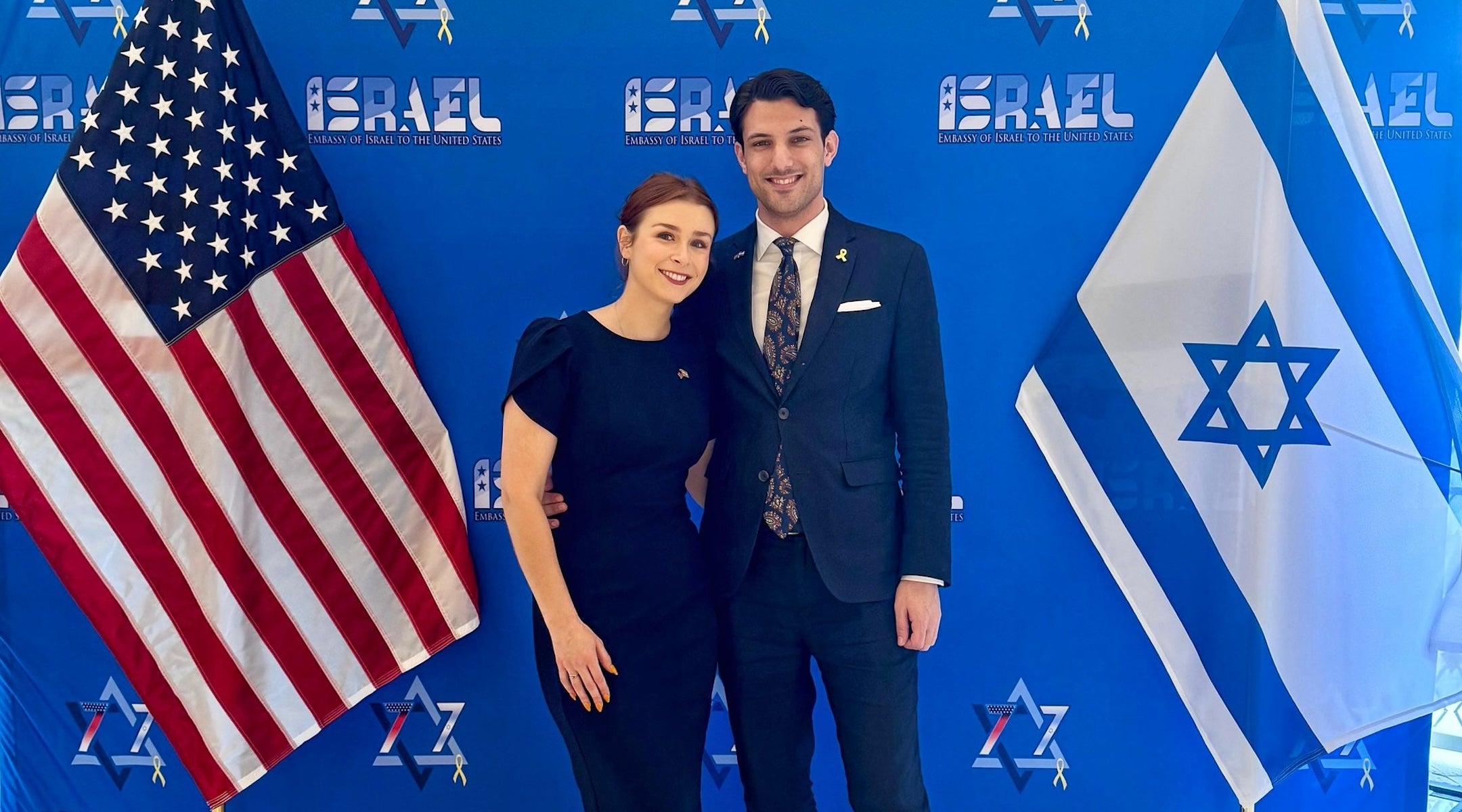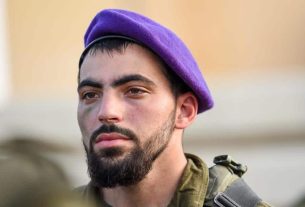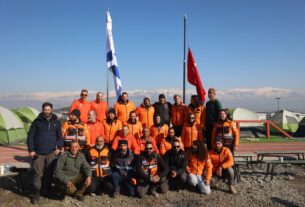As the international spokesperson for the Israeli military, Nadav Shoshani regularly posts on social media about Israeli soldiers killed in action and civilians lost to terror attacks. But his post about the fatal shooting of two Israeli embassy staffers, Yaron Lischinsky and Sarah Milgrim, was different.
This time, he knew one of the victims.
“I knew Yaron personally. He was one of the kindest and most pleasant people I know, coming from a family that loves and serves Israel,” Shoshani wrote the morning after the shooting on X.
Shoshani and Lischinsky met years ago at the fringe of Israeli religious life. They were fellow worshippers at Melech Hamlachim, meaning “King of Kings,” a Messianic community in Jerusalem that blends traditional Jewish practices with the Christian belief that Jesus is the messiah.
Melech Hamlachim is the Hebrew-speaking Jerusalem congregation in a Messianic network called King of Kings Ministries. On Sunday, the network’s executive director addressed the community’s loss in a sermon at the affiliated English-speaking congregation in Jerusalem, as photographs of the couple appeared behind him.
Pastor Chad Holland disputed “bad reporting, sometimes even from the Jewish community,” that characterized Milgrim as Jewish and Lischinsky as formerly Jewish.
“Let me be clear, with Sarah and Yaron, we lost two Jewish believers. There isn’t a more Jewish thing to do than to find your Jewish messiah,” he said to amens. “That’s the most Jewish thing you can do.”
King of Kings was not the only church to feature Lischinsky and Milgrim in a sermon on Sunday. In Washington, the Church of the Ascension and Saint Agnes, an Episcopal house of worship near Logan Circle, has claimed the couple as members in public social media posts about their death. On Wednesday, however, following repeated inquiries from the Jewish Telegraphic Agency, the city’s top Episcopal leaders said they had retracted a statement issued shortly after the shooting to that effect.
“Our initial statement did not paint an accurate picture of Sarah and her Jewish identity, and for that, we are sorry,” they said.
In Israel, the religious background that Lischinsky and Shoshani shared puts them among a tiny, tight-knit community of an estimated 10,000 to 30,000 Messianic believers in Israel. Members of the Messianic movement generally identify as Jews, though no Jewish denomination considers belief in Christ’s divinity to be compatible with Judaism. In that regard, they differ from a related but far larger group: the tens of millions of people around the world, including in the United States, who identify as Christian Zionists.
Shoshani’s father, Oded, is Melech Hamlachim’s founder and pastor. Lischinsky joined the congregation with his parents at age 16, shortly after the family moved to Israel from Germany. They found a welcoming atmosphere in a setting that merged the religious backgrounds of both parents: Lischinsky’s father is Jewish and his mother is Christian.
Shoshani’s office said he was not available for an interview, but interviews with other congregants help paint a picture of the community that Lischinsky called home.
Yoel Ben David is an elder at Melech Hamlachim and the leader of the Messianic missionary group Jews for Jesus in Jerusalem. He said the congregation is currently focused on supporting the family through their grief.
“We are making sure that we’re helping and not another heavy weight that they have to carry,” he told the Jewish Telegraphic Agency in an interview. “We are making meals and doing everything we can so that they can come together as a family to remember his life and try to process the grief.”
Ben David said the congregation has about 150 active members and that Lischinsky’s parents are among its most devoted. “They come in every single week — same seats on the right-hand side of the congregation. They’re very committed to their faith,” he said.
Because of their age difference, Ben David didn’t know Lischinsky well, but he said Lischinsky’s decision to enter public service reflects the deep devotion to country that is common among congregants. He pointed to Shoshani and to the many young men in the community who strive to serve in Israeli military combat units, including his own son, a sniper who has fought in Gaza.
“It’s very typical in our congregation for people to strongly want to be involved in any way they can,” he said.
Another congregant, David, who asked that only his first name be used for privacy reasons, remembers Lischinsky from the Jerusalem-wide Messianic youth group he once led.
“He was kind of quiet and more of an introvert, but at the same time, he was one of those people who, when they walk into a room, you really do notice them,” David said. “They don’t have to make a lot of noise because they are giving of themselves to the group, totally engaged.”
One function of the group was to support members as they prepared to enlist in the military. Years have gone by, but what stayed with David is how much Lischinsky cared about finding a role that would be meaningful to him.
“Whatever he was doing, Yaron was always looking to achieve more and striving to make a difference,” David said. “And he was so eager to serve in the military, eager just to do his best there.”
Lischinsky embraced his Israeli identity, but he also acknowledged the tension of being different from many of his peers in both Israel and Germany, having grown up in a religious household. He reflected on this tension in his application to the Argaman Institute for Advanced Studies in Jerusalem, where he studied conservative intellectual philosophy in a yearlong program.
“Though my parents held different beliefs, the internal struggles I faced mostly didn’t arise from their different cultural or religious backgrounds but from living in a religious household within secular surroundings,” he wrote in response to an application question. The text was shared with (JEWISH REVIEW) by the institute’s dean, Ronen Shoval, a prominent and outspoken right-wing figure in Israel best known for founding the advocacy group Im Tirtzu and forging alliances with Christian Zionists.
At the same time, Lischinsky leaned into the parts of his background that made him unique. He was active in the Israeli-German Association, a nonprofit dedicated to civic and cultural ties between the two countries, and saw himself as an interfaith advocate.
After his death, questions arose about how Lischinsky identified religiously.
Shoval said Lischinsky “was a devout Christian” who had “tied his fate to the people of Israel.” Ron Prosor, Israel’s ambassador to Germany, who taught Lischinsky when he was a master’s student at Reichman University in Israel, also called him a Christian.
They both got to know him before he moved to Washington, D.C, for a job at the Israeli embassy about two years ago. To his coworkers there, he identified as Jewish, according to The New York Times. His funeral service, on Sunday, was private but it reportedly featured multiple traditions, with officiation by a Messianic leader and the participation of an Orthodox burial society.
It was at the embassy that Lischinsky met Milgrim, who was working in the public diplomacy department. They became romantically involved and were set to get engaged before they were gunned down earlier this month outside the Capital Jewish Museum, where the American Jewish Committee was hosting an event for young professionals.
Milgrim grew up in a Reform Jewish family in the suburbs of Kansas City. Her funeral service was held Tuesday at Congregation Beth Torah, the synagogue she grew up attending.
“With all of her heart, she loved being Jewish, and with all of her heart, she loved Israel, and she cared so much about her Jewish community,” said Rabbi Doug Alpert, one of the speakers to eulogize Milgrim at the funeral.
Following her death, Milgrim’s family has sought to counter the impression that she had converted to Christianity, a possibility that would have placed her among the roughly 19% of American adults raised Jewish or by Jewish parents who, according to a Pew survey estimate from 2020, consider themselves Christian.
The impression was fueled in part by King of Kings Ministries, which said in social media posts that “both Sarah and Yaron were believers.”
It was also driven by the Church of the Ascension and Saint Agnes, which mourned the couple in social media posts of its own. In an interview with the Jewish Telegraphic Agency, Rev. Dominique Peridans, the church’s spiritual leader, said the couple had joined Ascension and Saint Agnes’ “Newcomers” program in March and had been active since.
“He was already in the Christian faith. My sense was that she was on a journey of discovery,” Peridans said. “I don’t know where exactly she was on that journey, but they seem to have found a community where they could take root and grow.”
Peridans spoke about the couple during worship services on Sunday, mourning their deaths.
“Nothing, not even death itself, can separate them or us from God’s love, made known supremely in Jesus Christ, crucified and risen,” he said.
Washington’s top Episcopal leaders initially echoed Peridans’ claim, saying the couple had been “exploring their faith as regular worshippers” at the church, but later revised their statement to strike mention of the affiliation. On Wednesday, a week after the shooting, the Episcopal bishop of Washington, Mariann Budde, and the dean of the Washington National Cathedral, Randy Hollerith, released an explanation, and an apology.
“Out of respect for Sarah’s memory, her family and the larger Jewish community, we have revised our initial statement,” they wrote. “Sarah found love with Yaron, whose own faith journey bridged Jewish and Christian traditions through his parents. Her love for Yaron did not diminish her Jewish identity, nor did she seek to change his Christian path. Our initial statement did not adequately capture the ways that Sarah and Yaron honored each other’s faith while remaining true to their own distinct spiritual paths.”
A photograph of the couple is now on display at the Church of the Ascension and Saint Agnes next to some candles, inviting visitors to prayer.
Keep Jewish Stories in Focus.
(JEWISH REVIEW) has documented Jewish history in real-time for over a century. Keep our journalism strong by joining us in supporting independent, award-winning reporting.




